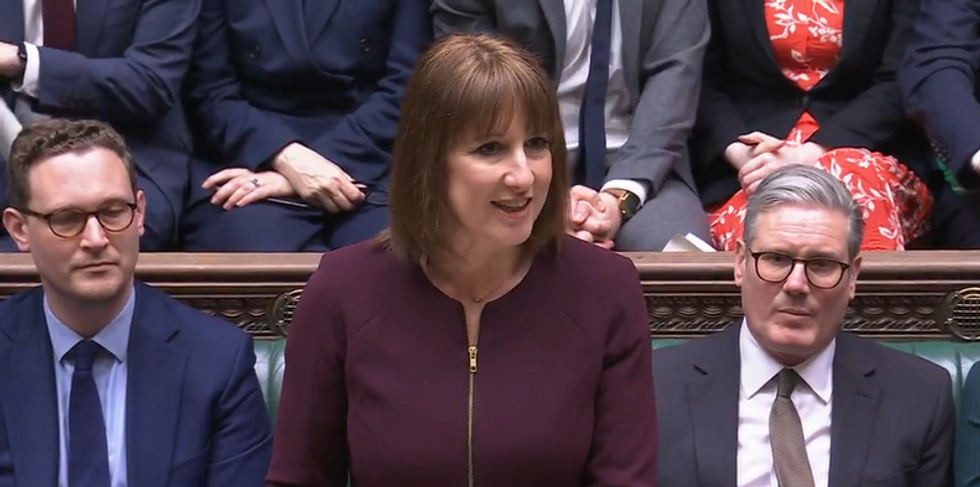Kemi Badenoch takes aim at Rachel Reeves following Spring Statement - 'Smoke …
GB News
The Chancellor's announcement in the Spring Statement was made alongside a fresh wave of spending cuts
Don't Miss
Most Read
Trending on GB News
The Chancellor's last-ditch attempt to revive the sluggish economy and balance the government books includes pension reforms.
The announcement was made during her Spring Statement on Wednesday, which also included fresh cuts to welfare spending, which the OBR estimates will save £4.8 billion, and confirmed increases to the defence budget.
Speaking in the Commons, she said he would return the UK to growth, adding: "Backing the builders, not the blockers, with a third runway at Heathrow Airport and the Planning and Infrastructure Bill and increasing investment with reforms to our pension system and a new national wealth fund, and tearing down regulatory barriers in every sector of our economy. That is a serious plan for growth. That is a serious plan to improve living standards. That is a serious plan to renew our country."
But what does Reeves actually mean when she says 'reforms to our pension system'?
Despite ruling out further taxes and spending, the Chancellor has been left with little room for manoeuvre after her £9.9billion fiscal headroom was wiped out due to anaemic growth and spiralling borrowing costs. The looming threat of Donald Trump's tariffs has also dampened the economic outlook.
As a result of this perfect storm, the OBR has halved its estimate for economic growth to 1.0 per cent in 2025 from 2.0 per cent.
Hopes that the Chancellor would use her Spring Statement to clarify her planned pension changes were swiftly dashed as welfare cuts took centre stage.
PensionBee UK chief business officer, Lisa Picardo, says it was "disheartening" to see that "pensions have been sidelined in the Spring Statement", adding: “We cannot afford to keep kicking the can down the road when it comes to pension reform. Every year of inaction risks leaving more people financially vulnerable in later life."

The Chancellor's last-ditch attempt to revive the sluggish economy and balance the government books includes plans to reform pensions
Getty Images
A central component of these reforms is the creation of "pension megafunds", which involve consolidating the 86 local government pension schemes into larger entities.
This consolidation is projected to unlock approximately £80billion for investments in UK assets, businesses, and infrastructure.
However, experts warn investing pensioners' savings in riskier assets could result in losses.
This concern was underlined in a report from the Pensions Policy Institute (PPI) - an independent research organisation that studies the UK pension system, which concluded: "There is a risk that policymakers might prioritise national economic objectives over the primary goal of pensions, which is to provide secure retirement income for individuals."
Reeves has also announced reforms designed to provide more flexibility in managing occupational defined benefit (DB) pension schemes, thereby fuelling investment in the wider economy.
The announcement back in January will see a lifting of restrictions on how “well-funded occupational defined benefit pension funds that are performing well” can invest their surplus funds.
This move is expected to unlock substantial amounts of money that has been “trapped” within these pension schemes, allowing it to flow into the broader economy.
Although the news was widely welcomed, Barnett Waddingham's partner and head of DB endgame strategy, Ian Mills, stressed the need to get the detail behind the proposals "right".
"Clearly, taking money out of DB schemes could worsen the security of the benefits promised from them," he stated.
"The rules regarding when and how money can be accessed will be critical. So we’ll be pouring over the details as soon as they’re published."
LATEST MEMBERSHIP DEVELOPMENTS

The Government also seems intent on pressing ahead with its plans to introduce inheritance tax (IHT) on pensions
Parliament UKThe Government also seems intent on pressing ahead with its plans to introduce inheritance tax (IHT) on pensions to ensure they are used as intended rather than as a means of wealth transfer.
The proposed pension tax changes are set to take effect a year later, in April 2027.
Currently, unused pensions are passed on tax-free, but under the new plans, any pension savings exceeding the £325,000 IHT threshold could be taxed as part of the estate.
With no draft legislation yet published and key details still unclear, critics argue that the Government is overpromising on a complex overhaul that could take years to implement.
Pension experts urge caution, warning that rushing to adjust financial plans now could be premature if the reforms don’t materialise on schedule.
Steve Bish, founder of S Bish Estate Planning said: "With the Government announcing changes to inheritance tax, it’s natural that many people are wondering whether they need to rewrite their Will. But right now I’m advising my clients to 'do nothing'.”
Pensions Minister, Torsten Bell, has confirmed that he intends to lay the Pensions Bill in parliament before summer recess, with the final report on the Pension Investment Review to be finalised in “the coming weeks”.








